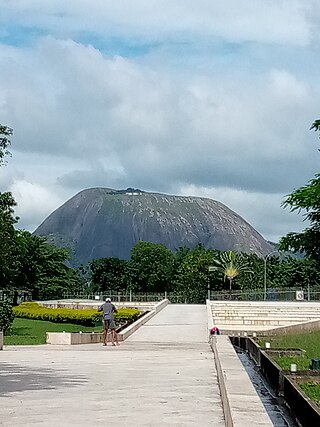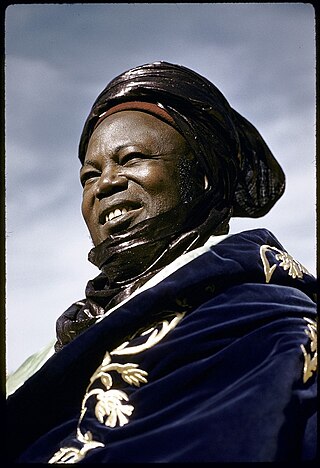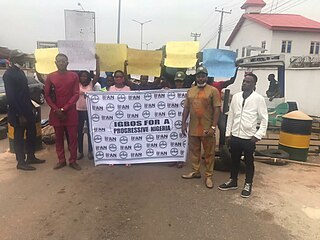
The history of Nigeria can be traced to the earliest inhabitants whose remains date from at least 13,000 BC through early civilizations such as the Nok culture which began around 1500 BC. Numerous ancient African civilizations settled in the region that is known today as Nigeria, such as the Kingdom of Nri, the Benin Empire, and the Oyo Empire. Islam reached Nigeria through the Bornu Empire between and Hausa Kingdom during the 11th century, while Christianity came to Nigeria in the 15th century through Augustinian and Capuchin monks from Portugal to the Kingdom of Warri. The Songhai Empire also occupied part of the region. Through contact with Europeans, early harbour towns such as Calabar, Badagry and Bonny emerged along the coast after 1480, which did business in the transatlantic slave trade, among other things. Conflicts in the hinterland, such as the civil war in the Oyo Empire, meant that new enslaved people were constantly being "supplied".

Nnamdi Benjamin Azikiwe, PC, usually referred to Zik, was a Nigerian politician, statesman, and revolutionary leader who served as the 3rd governor-general of Nigeria from 1960 to 1963 and the 1st president of Nigeria during the First Nigerian Republic (1963–1966). He is regarded as the "father of Nigerian nationalism", for driving force behind the nation's independence.

Sir Abubakar Tafawa Balewa was a Nigerian politician who served as the first and only prime minister of Nigeria upon independence. A conservative Anglophile, he favoured maintaining close ties with the British. During his first few years in office as prime minister, Nigeria was a constitutional monarchy with Elizabeth II reigning as Queen of Nigeria, until Nigeria became a republic in 1963. He was both a defender of Northern special interests and an advocate of Nigerian reform and unity.
The National Council of Nigeria and the Cameroons (NCNC) later changed to the National Convention of Nigerian Citizens, was a Nigerian nationalist political party from 1944 to 1966, during the period leading up to independence and immediately following independence.

Prince AkwekeAbyssinia Nwafor Orizu (GCON)(; 17 July 1914 – 1999) was a Nigerian Politician, who served as President of the Nigerian Senate from 1963 to 15 January 1966, during the Nigerian First Republic. Orizu was also Acting President of Nigeria from late 1965 until the military coup of January 1966. He was a member of the Nnewi Royal family. His nephew Igwe Kenneth Onyeneke Orizu III is the current Igwe (King) of Nnewi Kingdom. Nwafor Orizu College of Education in Nsugbe, Anambra State, is named after him.

Ahmadu Ibrahim Bello, famously known as Sardauna of Sokoto KBE, knighted as SirAhmadu Bello, was a conservative Nigerian statesman who masterminded Northern Nigeria through the independence of Nigeria in 1960 and served as its first and only premier from 1954 until his assassination in 1966, in which capacity he dominated national affairs for over a decade.

Colonial Nigeria was ruled by the British Empire from the mid-nineteenth century until 1960 when Nigeria achieved independence. Britain annexed Lagos in 1861 and established the Oil River Protectorate in 1884. British influence in the Niger area increased gradually over the 19th century, but Britain did not effectively occupy the area until 1885. Other European powers acknowledged Britain's dominance over the area in the 1885 Berlin Conference.

The First Republic was the republican government of Nigeria between 1963 and 1966 governed by the first republican constitution. The country's government was based on a federal form of the Westminster system. The period between 1 October 1960, when the country gained its independence and 15 January 1966, when the first military coup d’état took place, is also generally referred to as the First Republic. The first Republic of Nigeria was ruled by different leaders representing their regions as premiers in a federation during this period.

Emmanuel Mbela Lifafa Endeley, OBE was a Cameroonian politician who led Southern Cameroonian representatives out of the Eastern Nigerian House of Assembly in Enugu and negotiated the creation of the autonomous region of Southern Cameroons in 1954.
Eyo Ita (1903–1972) was a Nigerian educationist and politician from Creek Town, in present-day Cross River State, who was the leader of the Eastern Government of Nigeria in 1951 and the first Professor Nigeria ever had. He was one of the earliest Nigerian students who studied in the United States instead of the frequent route of studying in the United Kingdom. He was a deputy national president of the National Council of Nigeria and the Cameroons (NCNC) in the late 1940s and early 1950s.

Anti-Igbo sentiment encompasses a range of negative attitudes and feelings towards the Igbo people. The Igbo people make up all of south-eastern Nigeria and a part of south-south Nigeria's geopolitical zones. Igbophobia is observable in critical and hostile behaviour such as political and religious discrimination and violence towards the Igbo.

Parliamentary elections were held in Nigeria on 30 December 1964, although they were not held until 18 March 1965 in some constituencies in Eastern Region, Lagos, and Mid-Western Region due to a boycott in December. The election saw most parties run as part of alliances, the Nigerian National Alliance and the United Progressive Grand Alliance.
Pakistanism or Pakistanization is a neologism that refers to the continual division of any society along religious lines, with reference to the Partition of British India in 1947.

Nigerian nationalism asserts that Nigerians as a nation should promote the cultural unity of Nigerians. Nigerian nationalism is territorial nationalism and emphasizes a cultural connection of the people to the land, particularly the Niger and the Benue Rivers. It first emerged in the 1920s under the influence of Herbert Macaulay, who is considered to be the founder of Nigerian nationalism. It was founded because of the belief in the necessity for the people living in the British colony of Nigeria of multiple backgrounds to unite as one people to be able to resist colonialism. The people of Nigeria came together as they recognized the discrepancies of British policy. "The problem of ethnic nationalism in Nigeria came with the advent of colonialism. This happened when disparate, autonomous, heterogeneous and sub-national groups were merged to form a nation. Again, the colonialists created structural imbalances within the nation in terms of socio-economic projects, social development and establishment of administrative centres. This imbalance deepened the antipathies between the various ethnic nationalities in Nigeria ." The Nigerian nationalists' goal of achieving an independent sovereign state of Nigeria was achieved in 1960 when Nigeria declared its independence and British colonial rule ended. Nigeria's government has sought to unify the various peoples and regions of Nigeria since the country's independence in 1960.

Chief Theophilus Owolabi Shobowale Benson, S.A.N. was a Nigerian lawyer who became one of the most prominent Yoruba politicians in the period leading up to Nigerian independence in 1960. He served as the Minister of Information, Broadcasting and Culture in the first post-independence government. Benson was imprisoned for several months after the first military coup of 1966. He returned to practice as a barrister, and was recognised as a prominent Yoruba chief.
Orisadipe Obasa, was a Nigerian doctor and prince who played a significant role in the politics of Lagos in the first decades of the 20th century.

The Cabinet of Abubakar Tafawa Balewa was the government of Nigeria, headed by Prime Minister Abubakar Tafawa Balewa, in the years leading up to and following independence. There were three cabinets. The first was established in 1957 when Balewa was appointed Prime Minister by the British Governor-General. The second was formed after the general elections of December 1959, just before independence, in a coalition government. The third was formed after the disputed general elections of December 1964, and was dissolved after the military coup of 15 January 1966.

General elections were held in Nigeria in 1947. The Nigerian National Democratic Party (NNDP) won three of the four elected seats in the Legislative Council.

The history of voting rights in Nigeria mirrors the complexity of the nation itself.
Separatist movements of Nigeria want to achieve state secession, which is the withdrawal of one or more of the states of Nigeria from the multinational state of the Federal Republic of Nigeria. The only act of secession in Nigeria occurred from 1967 to 1970 during the Nigerian Civil War, when the breakaway republic of Biafra declared its independence from Nigeria and was eventually defeated. Ever since then, Nigeria has experienced the emergence of separatist movements seeking the independence of Biafra as well as other proposed states.













